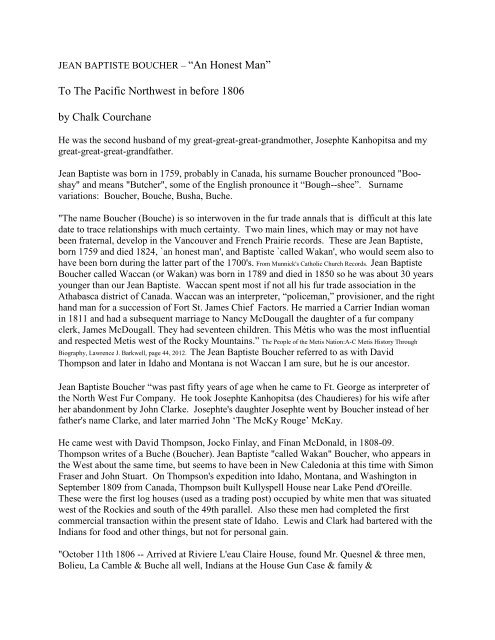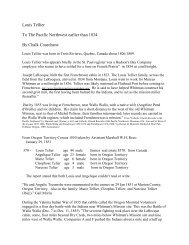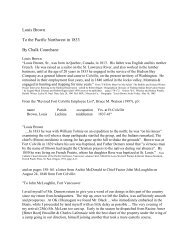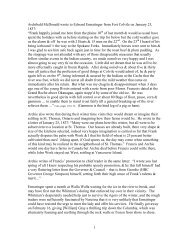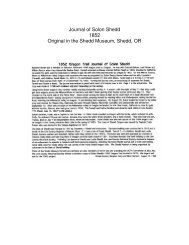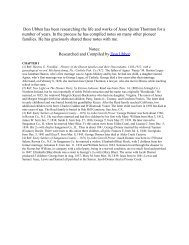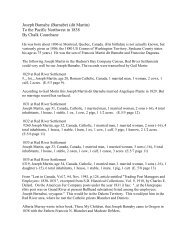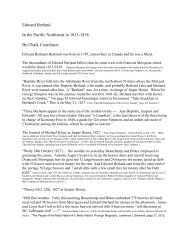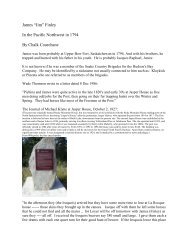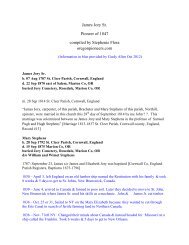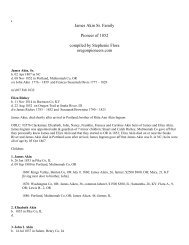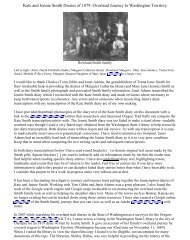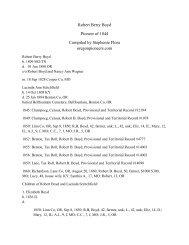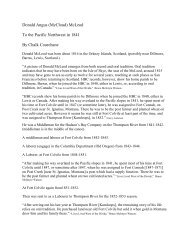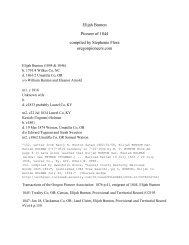BOUCHER, Jean Baptiste - Oregon Pioneers
BOUCHER, Jean Baptiste - Oregon Pioneers
BOUCHER, Jean Baptiste - Oregon Pioneers
- No tags were found...
Create successful ePaper yourself
Turn your PDF publications into a flip-book with our unique Google optimized e-Paper software.
eturned to Flathead Post with the best return ever from a brigade's expedition and from theSnake River country - over 5,000 furs. When he returned, Ross was given command of FlatheadPost, and Peter Skene Ogden replaced him as the head of the Snake River trade.Brenda SniderFrom "Metis Cousins""In July, 1810, Finan McDonald......together with Michael Bourdeaux (Michel Bourdon) and<strong>Baptiste</strong> Buche (Boucher), crossed Marias Pass with the Flathead Indians to hunt buffalo andmake provisions, thus being the first white men known to have passed through that pass. Theyalso enjoyed a lively battle with the Blackfeet east of the mountains." From EARLY FLATHEAD ANDTOBACCO PLAINS, A Narrative History of Northwestern Montana -- by Marie Cuffe Shea, 1977, page 7.From Thompson's Narrative, pp. 423-425: Thompson and his men were trading with theFlathead Indians in 1810, he wrote: "The Saleesh Indians during the winter had traded upwardsof twenty guns from me, with several hundreds of iron arrowheads, with which they thoughtthemselves a fair match for the Peeagan Indians in battle on the plains."In the month of July when the bison bulls are getting fat, they formed a camp of about onehundred and fifty men to hunt and make dried provisions as I had requested them, accompaniedby Mr. Finan McDonald, Michel Bourdeaux, and Buche with ammunition, tobacco &C toencourage them: They crossed the mountains by a wide defile of east passage, eastward of theSaleesh Lake, here they are watched by the Peeagans to prevent them hunting the bison, anddriven back, and could only hunt as it were by stealth; the case is now different, and they weredetermined to hunt boldly and try a battle with them."They were entering the grounds when the scouts, as usually, early each morning sent to viewthe country came riding at full speed, calling out, `The enemy is on us', instantly down went thetents, and tent poles, which with the baggage formed a rude rampart; this was barely done, whena steady charge of cavalry came on them, but the horses did not break through the rampart, partof which was pointed poles, each party discharged their arrows, which only wounded a few, nonefell; a second, and a third charge was made; but in a weak manner; the battle was now to be ofinfantry."The Saleesh about one hundred and fifty men, took possession of a slightly rising ground abouthalf a mile in front of their tents, the Peeagans, about one hundred and seventy men drew up andformed a rude line about four hundred yards in front of them; the Saleesh and the Whitemen layquiet on the defensive; the Peeagans from time to time throughout the day, sent parties of aboutforty men forward, to dare them to battle; these would often approach to within sixty to eightyyards, insulting them as old women, and dancing in a frantic manner, now springing from theground as high as they could, then close to the ground, now to the right, and to the left; in allposture; their war coats of leather handing loose before them, their guns, or bows and arrows, orlance in their hands, the two former they sometimes discharged at their enemies with little effect."Buche (Boucher) who was a good shot, said they were harder to hit than a goose on the wing.When these were tired they returned and a fresh party came forward in a like manner, and thusthroughout the day, the three men had several shots discharged at them, but their violent gesturesprevented a steady aim in return; the three men were good shots, and as I have noticed theIndians allow no neutrals, they had to fight in their own defence. Mr. Finan McDonald fired
"At Spokane House I remained but a few days. Instead of my complement of eighty men, Icould only muster forty, and of that small number, many of them were questionable. With thesehowever, I left on the 12th of November and proceeded up Flathead River (Clark's Fork) to thepost of that name (Flathead House or Post), situated at the foot of the mountains. There Iremained for some time and picked up fourteen more making my party, including myself, in all55 persons, each of which had to be fitted out according to his capacity as a hunter with a gun,from two to four horses, and from six to ten steel traps besides clothing and ammunition, andgenerally on credit. With this number I made preparations for setting out on my expedition."On assembling my people I smiled at the medley, the variety of accents of dresses, habits, andideas; but above all, at the confusion of languages in our camp in which were two Americans,seventeen Canadians, five half-breeds from the east side of the mountains, twelve Iroquois, twoAbanakee (Anenaki) Indians from Lower Canada, two natives from Lake Nepissing (Nipissing),one Saultman (Chippewa) from Lake Huron, two Crees from Athabasca, one Chinook, twoSpokanes, two Kouttannois (Kootenais), three Flatheads, two Callispellums (either Pendd'Oreille or Kalispel), one Palooche (Palouse), and one Snake slave! Five of the Canadians wereabove sixty years of age, and two were on the wrong side of seventy.""In summing up however, we must not forget that twenty-five of the party were married andseveral of the youngsters carried guns; so that in our camp there were exclusive of the mentwenty five women and sixty four children. The rest of the equipment consisted of seventy-fiveguns, a brass three pounder, two hundred and twelve beaver traps, and three hundred and ninetyhorses, together with a good stock of powder and ball and some trading articles."Among the group were Josephte Kanhopitsa, Josephte Clarke, Elizabeth Boucher, and <strong>Jean</strong><strong>Baptiste</strong> Boucher, Jr."On half, perhaps two-thirds of the people I had under my command were more expert at thebow and arrow than at the use of the beaver trap, more accustomed to indolence and free willthan to subordination."This party being now ready, we left the Flathead and proceeded on our journey. By starting inthe depth of winter less difficulty was experienced in providing for so many people. Our campwith all its defects appeared at a little distance somewhat formidable. The whole cavalcade whenin marching order presented a line of a mile or more in length. Having made about eight milesand killing only one deer for we had to depend upon our guns for our supper, that small animalproved but a slender repast for a hundred thirty-seven hungry mouths."Ross took the brigade up the Clark's Fork to Wild Horse Plains, (or Horse Plains near FlatheadPost) still later to be known as Plains. En route south from "Prairie de Cheveaux", here he turnednorth using a well-known Indian trail, which "generally paralleled the current route of State 28connecting the towns of Plains and Hot Springs. Near the Camas Prairie. Thompson - The Saleesh HousePeriod 1807-1812 - Sometimes Only Horses to East", Carl W. Haywood, Stoneydale Press (Rockman's Trading Post, Inc., 2008, page 47).The party camped at Camas Prairie, where they dined on 6 deer, "so we had a better supper andwe required it for we had passed two days on only one light meal. The following day we passedthe crossing place....." "Near the Camas Prairie Cutoff road near the outlet of Dog Lake (now
"Despite various alarms in a country of previous Indian trouble, the expedition lost but twomembers neither to hostile action. A few days from the outset, `Antoine Valle's boy died' andnear the close of the hunt `this morning after an illness of twenty days during which we carriedhim on a stretcher died <strong>Jean</strong> Ba't Boucher, aged 65, an honest man." The Mountain Men, Vol. 7, "FrancoisRivet", p. 240.He had two children with Josephte Kanhopitsa:1. <strong>Jean</strong> <strong>Baptiste</strong> Boucher, Jr. born in 1819 and Elizabeth "Isabelle" Boucher, both were born atthe Foot of the Lakes, British Columbia, Canada. <strong>Jean</strong> <strong>Baptiste</strong>, Jr. was baptized many yearslater on December 6, 1846 at St. Louis Mission, Marion Co., <strong>Oregon</strong> Territory.From the "Revised Fort Colville Employee List", Bruce M. Watson (1997), p3:"Boucher/Bouche, <strong>Baptiste</strong> native apprentice 1841-44"1844 tax book of <strong>Oregon</strong> shows: <strong>Baptiste</strong> Busha with horses valued at $30.00 & Hogs at $20.00.He paid tax of $.56. It also shows a James and a Francois Busha.The 6 December, 1846, we undersigned missionary of the Company of Jesus have baptized J.<strong>Baptiste</strong> Bouche, adult. Godfather Gedeon Senecal, godmother Isabelle Wollan (Wakan,Humperville)."2. Elizabeth Boucher was born at the Foot of the Lakes in British Columbia in about 1821. Shemarried Joseph Barnaby (Barnabe) at St. Paul Mission, <strong>Oregon</strong> Territory on November 12, 1839.They were to have at least 13 children.From Catholic Church Records of the Pacific Northwest - Munnick:"This 12 November, 1839, we priest undersigned have baptized Isabelle, aged 18 years, naturaldaughter of the late <strong>Jean</strong> <strong>Baptiste</strong> Boucher, and of Josephte, infidel Indian woman. GodfatherAndre Picard, Godmother Marie Okanogan, who have not known how to sign.F.N. Blanchet, priest,V.G."She was present when her father, <strong>Jean</strong> <strong>Baptiste</strong> Boucher, died in June of 1824 somewhere inIdaho, while on a HBC expedition to trap beaver. Isabelle (Elizabeth), her sister, Josephte, andher brother, <strong>Jean</strong> <strong>Baptiste</strong> were all taken under the care of Joachim Hubert when he married theirmother, Josephte Kanhopitsa Boucher.Elizabeth's marriage record reads:M-2"This 12 November, 1839, in view of the dispensation of one ban granted by us missionary, andthe publication of two others, between Joseph Barnabe, domiciled in this place, legitimate son ofFrancois Barnabe and of Francoise Dagneau, of Montreal, in Canada, on one part, and IsabelleBoucher, domiciled in this place, natural daughter of the late <strong>Jean</strong> <strong>Baptiste</strong> Boucher and ofJosephte of Colville, on the other part, nor having discovered any impediment, we priestundersigned missionary of the Columbia, have received their mutual consent of marriage andhave given them the nuptial benediction in presence of Andre Picard and of Hyacinthe
Lavigueur, witnesses, before whom the said spouses have recognized as their legitimate childAdelaide, aged 1 year. The witnesses as well as the spouses have not known how to sign.F.N.Blanchet, priest, V.G."


